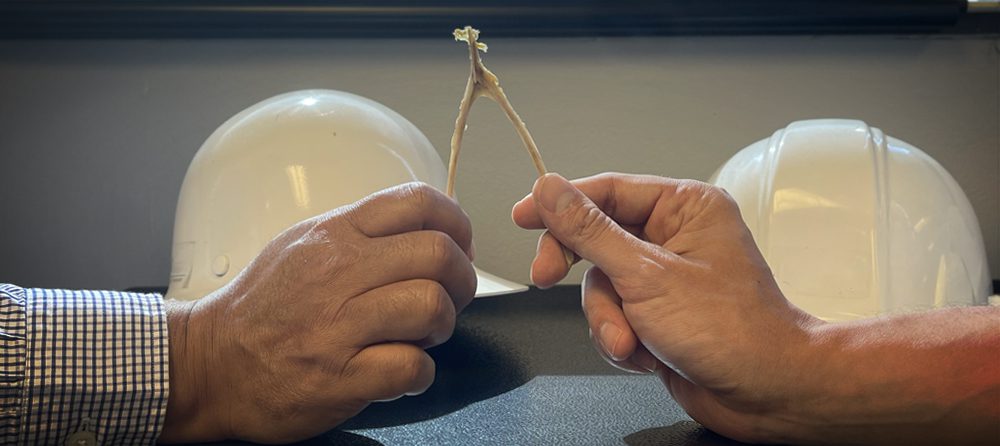I grew up a day’s drive from Plymouth Rock, where it’s claimed the first settlers of New England disembarked the Mayflower in the 1600s to make a permanent home in America. One game that came with them was the wishbone game. As a child, it was always fun to play, making a wish and hoping you got the bigger side of the wishbone when it broke so it would come true. As I moved through childhood, each time I played, I tried different strategies. Yet win or lose, the adult in the room officiating would remind us that, unfortunately, there was only one or sometimes two wishbones (if gathering with a big crowd), and while two or four of us children got to hold on to the wishbone and play, being a good sport (win or lose) or spectator determined our further rewards, which often meant dessert, staying with our cousins longer, or something we did not want to miss because of bad behavior.
An article from Modern Farmer gives a more in-depth history of the wishbone game and says,
“The Romans passed the wishbone-breaking tradition along to the English, who brought the ritual with them over to Plymouth Rock. Here, the abundance of wild turkeys provoked a switch in the fowl, from chickens to turkeys.”
The Modern Farmer goes on to explain the physics behind the breaking of the wishbone:
“The physics behind wishbone breaking is simple. As Newton’s Third Law of Motion states: Every action has an equal and opposite reaction.”
Newton’s Third Law of Motion is in your and my workplace every day. Hopefully, you, as I, do not consider the workplace a game, but gaming attributes exist. How you react to your anticipated response of the person you are interacting with can ultimately lead to a break in the backbone or structural stability of the situation itself, no matter what your “wish” is.
In the construction management workplace, that could be:
- Getting offered “useful feedback” by someone only to get very defensive or give an indignant reaction, leaving the other party unsure about your commitment to apply the feedback.
- Making an agreement and giving a commitment to your supervisor, co-worker, or sub-contractor on specific next steps. Yet your follow-through is disproportionate to their commitment.
- You agree to written expectations upon hire at a company, and yet your behavior contradicts your ability to perform to meet those expectations.
With each of these examples that you can inertly be the culprit of, you may also know what it feels like when you are on the receiving end of another who chooses to react opposingly after the guidelines are established and agreed upon. Wishing things were different and working toward making things different when we fail in our behavior is where the structural stability of a situation is restored or continues to erode.
When playing the wishbone game, you can just hold your end and let your opponent do all the work. You can pull hard and fast out of the gate; you can tug slightly to see what reaction you get from your opponent and the wishbone itself; you can both come pulling hard. When the mutual tug from both players is greater than the bone’s ability to hold itself together, the break happens, and you find out if you got the short end or not. The same happens in business dealings when two parties disagree, adding strain. If not resolved, eventually, the relationship breaks, and someone is left holding the short end of the situation. Reputations are tarnished, projects are delayed, money is lost, and often one or the other party experiences job loss.
Your behavior during and after a situation that plays out in business determines how well or often others might want to engage with you in the future.
Are you in workplace wishbone mode, hoping things turn out well when you or someone else is a bad sport in a given situation? Don’t wish things were different. God gave you a backbone and not a wishbone for a reason.
Country singer Reba McEntire said through her challenges,
“To succeed in life, you need three things: a wishbone, a backbone, and a funny bone.”
In studying for this blog, I found all the articles showed people pulling on the wishbone with the top of the V upside down and the point facing up. I also read that they do it with elbows on the table. As a child, I remember standing across from my opponent with the V open up, and when we heard “go,” making our choice of pulling hard or holding tight. It made me laugh and wonder why I never read into what rules had been established when doing it with my children. Sounds like what happens in the workplace when people interact without knowing if everyone is playing the game by the same rules.
It’s okay to wish things were different; although don’t expect them to be without doing your part to establish guidelines and ease the tension when the reaction isn’t what you expected. It is often comical when you look back and see that out of ignorance (and not intentionally to cause stress), you were both playing with a different set of rules.
May Your Wishbone, Backbone, and Funny Bone All Be Put to Good Use!
Suzanne Breistol




